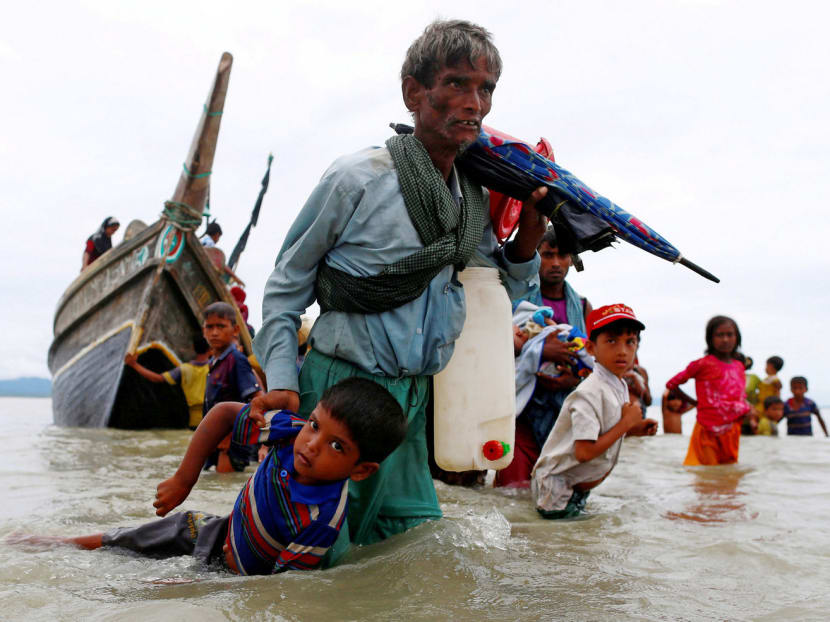UN accuses Myanmar of ‘textbook ethnic cleansing’
COX’S BAZAR (Bangladesh) — The situation in Myanmar is a “textbook example of ethnic cleansing”, the United Nations said yesterday, as the number of Rohingya Muslims fleeing Myanmar for Bangladesh topped 300,000.

A Rohingya refugee dragging a child to shore after crossing the Bangladesh-Myanmar border by boat, on Sunday. Photo: Reuters
COX’S BAZAR (Bangladesh) — The situation in Myanmar is a “textbook example of ethnic cleansing”, the United Nations said yesterday, as the number of Rohingya Muslims fleeing Myanmar for Bangladesh topped 300,000.
The UN warning came as it emerged that the Dalai Lama had written to Ms Aung San Suu Kyi urging Myanmar’s de facto civilian leader to find a peaceful solution to the crisis in the mainly Buddhist country.
UN human rights chief Zeid Ra’ad Hussein slammed Myanmar of waging a “systematic attack” on the Rohingya and warned that “ethnic cleansing” seemed to be under way.
“Because Myanmar has refused access to human rights investigators, the current situation cannot yet be fully assessed, but the situation seems a textbook example of ethnic cleansing,” he told the UN Human Rights Council. The Rohingya minority community has long been subjected to discrimination in Myanmar, which denies them citizenship.
The UN says 313,000 bedraggled and exhausted Rohingya refugees have arrived in Bangladesh since attacks by Rohingya militants on Myanmar security forces in neighbouring Rakhine state on Aug 25 sparked a major military backlash.
Tens of thousands more are believed to be on the move inside Rakhine after more than two weeks without shelter, food and water.
“The operation (by the Myanmar government against militants) ... is clearly disproportionate and without regard for basic principles of international law,” Mr Zeid noted.
“We have received multiple reports and satellite imagery of security forces and local militia burning Rohingya villages, and consistent accounts of extra-judicial killings, including shooting fleeing civilians,” he said.
The UN and the Bangladesh government have said the number arriving has slowed down in recent days although the situation is still volatile.
On Sunday, the UN said some 294,000 Rohingya had arrived, a jump of only 4,000 from the previous day. “Many new arrivals are still on the move and residing on the roadsides, and are left out of the calculations due to the lack of comprehensive tracking mechanism,” said a UN coordination report yesterday.
Ms Aung San Suu Kyi’s government has come in for strong international criticism over the military’s treatment of the Rohingya.
“I call on the government to end its current cruel military operation, with accountability for all violations that have occurred, and to reverse the pattern of severe and widespread discrimination against the Rohingya population,” Mr Zeid said.
He said he was particularly “appalled” by reports that the Myanmar authorities had begun laying landmines along the border with Bangladesh to prevent those who fled from returning.
He also criticised “official statements that refugees who have fled the violence will only be allowed back if they can provide ‘proof of nationality’,” pointing out that since 1962 Myanmar had been stripping Rohingya of a wide range of rights, including citizenship. “This measure resembles a cynical ploy to forcibly transfer large numbers of people without possibility of return,” he said.
Meanwhile, communal tensions appeared to be rising across Myanmar yesterday after two weeks of violence in Rakhine state, prompting the government to tighten security at Buddhist pagodas. Rumours have spread on social media that Muslims, who represent about 4.3 per cent of the Buddhist-majority country’s population of 51.4 million, would stage attacks to avenge violence against the Rohingya. AGENCIES






